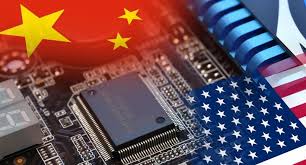Turkistan Times, 8 October 2025 - U.S. lawmakers are calling for much broader restrictions on the sale of semiconductor manufacturing tools to China, arguing that advanced technology exports are strengthening Beijing’s industrial and surveillance capacity. The move follows a bipartisan investigation revealing that Chinese chipmakers bought $38 billion worth of sophisticated equipment last year — a 66 percent increase from 2022 — despite a series of export controls, according to Reuters.
A report by the U.S. House of Representatives Select Committee on the Chinese Communist Party found that inconsistencies among export rules in the United States, Japan, and the Netherlands allowed non-U.S. toolmakers to sell technologies that American companies were barred from providing. Lawmakers said this gap has undermined the intent of Washington’s restrictions and urged a coordinated, multilateral ban covering all chipmaking tools and components, rather than narrow blacklists of individual Chinese firms.
According to Reuters, the committee found that last year’s $38 billion in purchases accounted for nearly 39 percent of the combined global sales of five major suppliers — Applied Materials, Lam Research, KLA, ASML, and Tokyo Electron. “These are the sales that made China increasingly competitive in the manufacture of a wide range of semiconductors, with profound implications for human rights and democratic values around the world,” the report stated.
Three Chinese companies — SwaySure Technology Co, Shenzhen Pengxinxu Technology Co, and SiEn (Qingdao) Integrated Circuits Co — were identified as key buyers of restricted technologies. The committee linked them to a secret supply network supporting Huawei Technologies, prompting the U.S. Commerce Department to impose export bans on those firms late last year.
Industry executives say the tightening rules are already reshaping the market. Mark Dougherty, president of Tokyo Electron U.S., told Reuters that sales to China have started to decline, in part due to new regulations. He welcomed greater alignment between Washington and Tokyo, saying that “from a U.S. perspective, there’s an outcome that is still desired that has not yet been achieved.”
Both Republican and Democratic administrations have sought to slow China’s technological rise, especially in sectors such as artificial intelligence and defense modernization. But this latest push intertwines national security with human rights concerns — particularly over Beijing’s repression of Uyghur Muslims in East Turkistan, officially known as the Xinjiang Uyghur Autonomous Region.
In January 2021, the U.S. government formally determined that China’s treatment of Uyghurs constituted genocide and crimes against humanity, citing evidence of mass detentions, forced labor, and coercive assimilation policies. Later that year, Congress passed the Uyghur Forced Labor Prevention Act (UFLPA), creating a presumption that all goods originating from East Turkistan involve forced labor unless proven otherwise. The law, which took effect in 2022, has blocked imports from dozens of Chinese firms, according to Reuters and U.S. government records.
Human rights advocates say China’s growing access to advanced semiconductor equipment indirectly fuels repression by enhancing state surveillance systems in East Turkistan. Some lawmakers have echoed that view, arguing that technology and moral policy cannot be separated. “Every advanced chip sold today can power tools of control tomorrow,” one congressional aide told Reuters.
Analysts note that China is now accelerating efforts to build its own chipmaking supply chain to reduce dependence on Western firms. “China is attempting to rewrite the entire supply chain,” said Craig Singleton, a senior fellow at the Foundation for Defense of Democracies. “What used to be niche tool segments are now battlegrounds.”
While ASML and KLA declined to comment and Applied Materials and Lam Research did not respond to Reuters’ requests, all five toolmakers cooperated with the congressional inquiry and were briefed on its findings. The committee concluded that without tighter coordination among allied nations, the U.S. risks “unintentionally fueling the very technological ecosystem that threatens both global security and fundamental human rights.”
Based on reporting by Reuters, October 2025.

